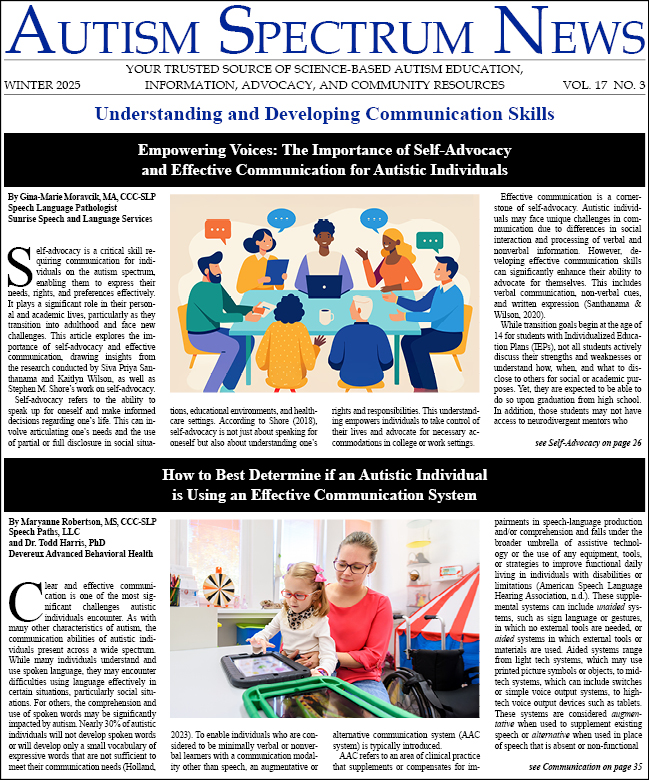-
Providing Opportunities for Employment
Integrated work experiences enhance the quality of life for those living with ASD, reduce financial strain on aging parents, and contribute to the economic development of communities. A lack of supports and low expectations can result in sheltered work experiences, unemployment, and underemployment...
-
The Impact of Expressive, Receptive, and Pragmatic Language Deficits in the Workplace
Most individuals with autism spectrum disorders (ASD) have vocational strengths and are increasingly being hired by small businesses and corporate chains. ASD, by definition, is characterized by communication deficits. Once hired, these deficits present as challenges for individuals with ASD....
-
Workplace Insecurities – Changing the Tide for Adults on the Spectrum
At some point, most of us will find ourselves writing a resume, going on an interview and, hopefully, fielding a job offer. We’ll spend most of our adult lives waking up, enduring some kind of commute, performing a series of tasks, returning home — only to repeat the process again the next day....
-
When College is Not an Option
College is generally considered the best path to a successful career, but the classes and structure of college can present a daunting challenge to individuals on the spectrum. The description of a “good job” might include factors of salary, stability, and the ability to grow; such jobs are not...
-
What Employers Need to Know About Asperger’s Syndrome: Accommodating Managers and Professionals on the Spectrum
There is increasing evidence, albeit anecdotal, that autism is now on the radar screens of employers. Last year, SAP, the giant software company, pledged that in the next few years 1% of its workforce will be individuals on the autism spectrum. The announcement generated widespread publicity....
-
An Employer’s Perspective on the Benefits of Training People with Autism
As part of its clinical mission, NewYork-Presbyterian Hospital/Westchester Division (NYP/WD) cares for patients so they are prepared to return to their home communities to lead productive lives. To successfully achieve this, patients are given the necessary tools to be able to work and live. In...
-
Becoming an Autism Employment Entrepreneur
Last fall, after a 30-year career in corporate marketing, I joined the ranks of a handful of other parents and social service agencies in a new movement referred to as autism employment entrepreneurship. I founded Yes She Can Inc. as a nonprofit dedicated to developing job skills and employment...
-
Creating the Path to Employment
New York Collaborates for Autism (NYCA) creates comprehensive, evidence-based community services to support people living with autism spectrum disorders (ASD) right now. In 2011, NYCA turned its attention toward creating employment opportunities for young adults with ASD. As part of its research...
-
The Alien World of Work for Adults with Autism
After college, one is confronted with the confounding world of job searching. Unlike anything one has experienced before, a job search is filled with resumes, cover letters, and interviews, salary negotiations, networking, and writing that looks nothing like the work just finished to earn a degree....
-
The Power of Dialogue: Small Business and Career Mentoring
As a small business owner and non-profit administrator, I have had exposure to a variety of work experiences. The most difficult experiences ultimately taught me new strategies I didn’t know I needed to learn. For example, in a job interview several years ago, I disclosed my diagnosis of autism....




